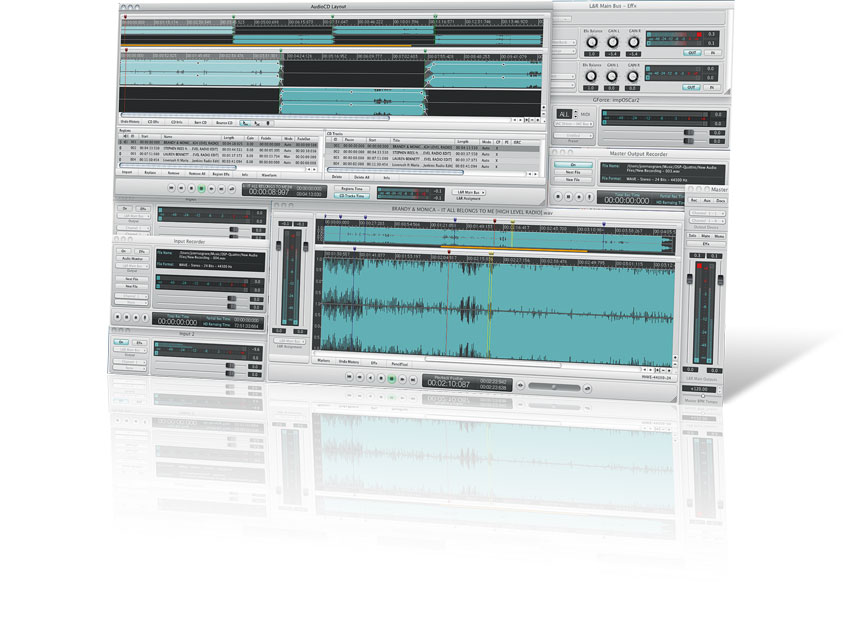MusicRadar Verdict
As a straight-up audio editor, DSP-Quattro is a bargain; its powerful instrument hosting and routing options are impressive bonuses.
Pros
- +
Good CD mastering feature-set More than just an editing/mastering app. Unbelievably good value. Functional and pleasing visual design.
Cons
- -
No spectrum analysis tools. Would benefit from global workspace. Built-in effects could be more extensive.
MusicRadar's got your back
No audio editor is ever going to set the world on fire, but for Mac musicians, i3's DSP-Quattro has long been a useful companion. Now at version 4, it's been so long since the last update that we're going to look at the program in its entirety here.
The app includes all your typical audio editor functionality (recording, editing, import, export, pitchshifting and timestretching), works natively with WAV, AIF and SDII format files, and imports/exports many other common formats.
"The precise yet stylish Logic-style graphics feel instantly familiar"
You get infinite undo/redo, automatic BPM detection, audio scrub, reverse and 'varispeed' playback, markers, loop points and independent editing of L/R channels. The whole workspace can be saved as a project, plus multiple audio files, inputs and effects chains can be loaded simultaneously. Oh, and it can also host virtual instruments.
A selection of effects (chorus, delays, reverbs, EQs, filters, etc) is included, as well as the usual offline processors (de-clicking, resampling, pitchshifting, etc). The software supports VST 2.4 and AU plug-ins both for real-time use as inserts and for rendering offline as a chain.
DSP-Quattro supports Red Book CD mastering with direct CD master burning or export in various formats, including DDP2. Finally, batch processing is also on offer.
A different approach
The main thing you should understand about DSP-Quattro is that it's a modular system, with sound-producing modules called Audio Generators. These include the Input, Input Recorder, Virtual Instrument and Audio File Player modules, which feed into the Audio Output and Output Recorder modules.
You can freely arrange all of these and hide, deactivate and generally organise stuff in the Documents window, which lists all of the active Generators. On paper, this might all sound slightly odd, but it's an extremely flexible system, and with four internal stereo channels and hardware routing built into many of the modules, creative routing setups can be built to an extent that we've not seen in an audio editor before.
Ultimately, we'd prefer a global workspace-based layout rather than DSP-Quattro's 'start from scratch with each new file' approach, but the Project file type does recall your exact window layout. Once you've found a setup that works, use it as a template.
Despite being quite 'different', DSP-Quattro is admirably self-explanatory in many respects, and the precise yet stylish Logic-style graphics feel instantly familiar. It makes it easy to put together a CD master, with crossfades, ISRCs and track- by-track and global insert processing.
The onboard effects do the job, although for serious mastering, you'll be glad of the AU/VST support. Basic audio editing and looping is easily applied, and with audio scrub, you can even find your edit points by ear if you like. On the downside, although you get peak/RMS metering, there are no built-in spectral analysis tools.
DSP-Quattro gets a big thumbs-up for its routing flexibility and virtual instrument support, going beyond your basic audio editor in that sense. For heavyweight audio editing, it's not as feature-packed as the likes of WaveLab, but then it's nowhere near as expensive. Throughout our testing, we were constantly and pleasantly surprised by the way it handled itself.
Computer Music magazine is the world’s best selling publication dedicated solely to making great music with your Mac or PC computer. Each issue it brings its lucky readers the best in cutting-edge tutorials, need-to-know, expert software reviews and even all the tools you actually need to make great music today, courtesy of our legendary CM Plugin Suite.
“A synthesizer that is both easy to use and fun to play whilst maintaining a decent degree of programming depth and flexibility”: PWM Mantis review
“I feel like that song had everything we needed to come back with”: Bring Me The Horizon’s Lee Malia on Shadow Moses, its riff and the secrets behind its tone, and why it was the right anthem at the right time
“I said, ‘Are we sure we can write a song about death?’”: The story of Mike + The Mechanics' classic No.1 The Living Years











